
Adding an accessory dwelling unit (ADU) to your property in Florida opens the door to practical, flexible living solutions. ADUs can generate rental income, provide a comfortable space for an aging parent, or offer your college graduate an affordable place to live close to home. This type of housing expands how your property can be used, without the need to relocate or take on major renovations to the main home.
But finding clear guidance can be difficult. Every county—and often each city—has its own rules for square footage, setbacks, placement, and permits. It’s not always obvious where to start or who to contact for the most accurate information.
To simplify the process, we’ve compiled ADU requirements for all 67 counties in Florida, along with key contact details for local planning departments. In addition to the counties, we have listed a few of the larger cities where their rules may differ from the standards of the county they are in.
Ready to understand more about what specifications your property must meet for an ADU in Florida? Keep reading, and we will help you find the answer!
Are ADUs Allowed in Florida?

Yes, many areas in Florida allow accessory dwelling units (ADUs). However, whether they are permitted and the specific requirements vary depending on where you live. It’s essential to check with your local officials to understand how an ADU is defined in your area and whether they can be used as a dwelling unit.
What Are the Laws for Accessory Dwelling Units in Florida?
Florida Statute 163.31771 is a statewide provision that encourages the development of accessory dwelling units to increase affordable housing options. It expresses the Florida Legislature’s intent for local governments to adopt ordinances that allow ADUs in single-family residential areas, particularly to benefit elderly persons and individuals with low or moderate income.
The statute defines ADUs, permits their use as rental units, and designates local governments (counties or municipalities) responsible for adopting and enforcing related land development regulations.
Curious what other states are ADU-friendly? Read the article on the top 7 friendly ADU states. Who knows, maybe you’ll want to check out one of these places to live instead
ADUs That Are Allowed in Florida
At Zook Cabins, all the ADUs we offer would be perfect for your needs in Florida. Our smallest ADU starts at 597 square feet, and our largest can be built up to 848 square feet. Take a look at the models that we have to offer below, and we will be happy to help you get the perfect ADU for your property.
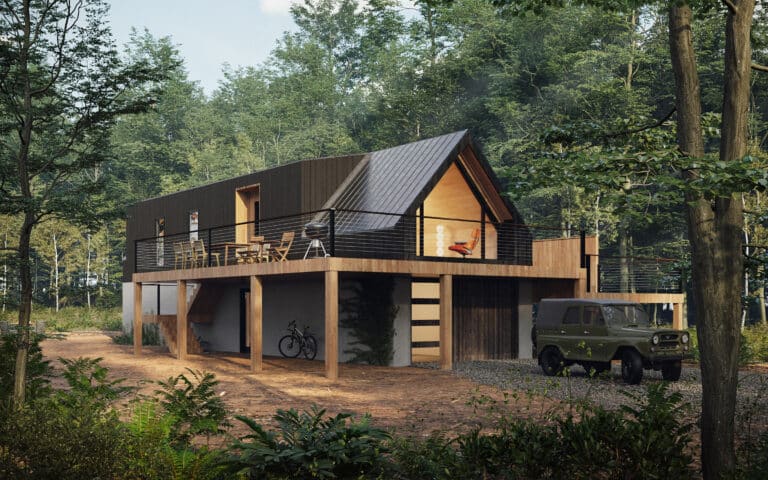
The A-Frame ADU
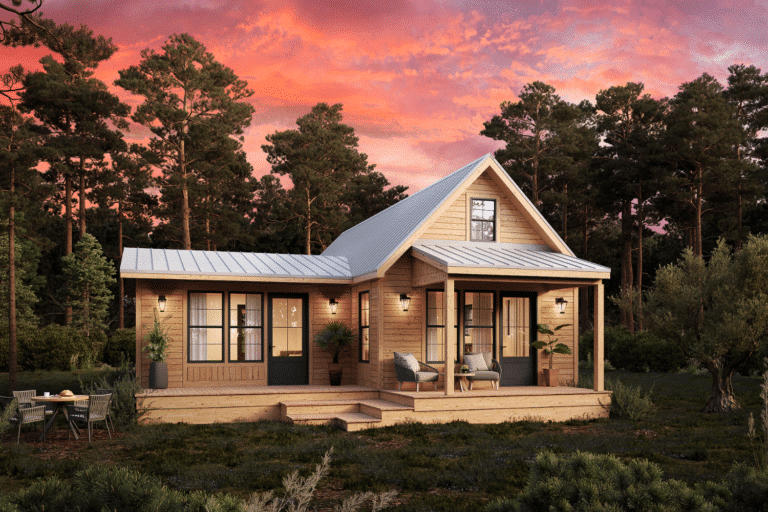
The Grove ADU
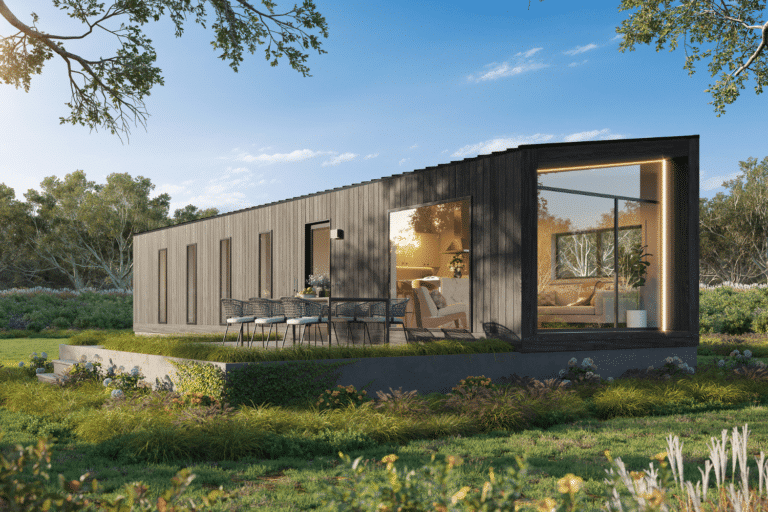
The Luna ADU
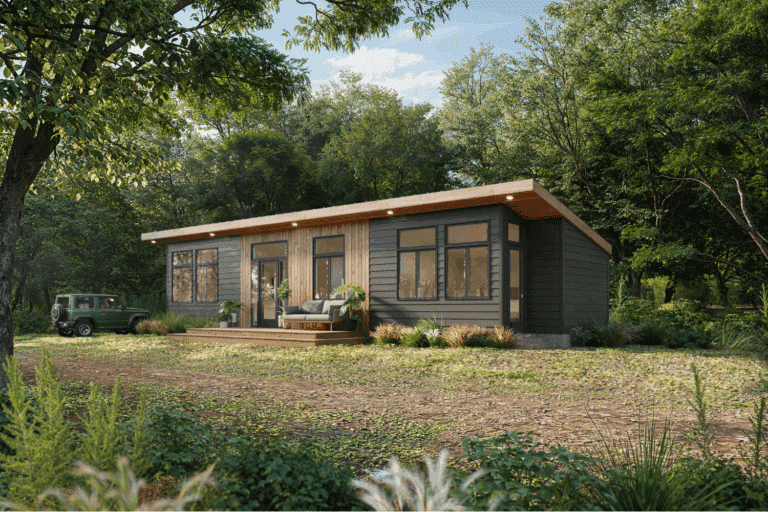
The Sonoma ADU
What Is Considered An ADU in Florida?
According to Florida statutes, an “accessory dwelling unit” is a secondary living space with its own kitchen, bathroom, and sleeping area. It can be located within the primary dwelling or exist as a separate structure on the same property.
An ADU can take various forms, such as a converted garage, an apartment above a garage, an addition to the main home, or a standalone building, as long as it complies with local ADU regulations. If you want to know how to make the best use of your space, contact Zook Cabins. We would be happy to talk you through the possible options for your ADU.
Since definitions and requirements for ADUs can vary across jurisdictions, it’s essential to check with your local planning, zoning, or building department to understand the specific rules that apply in your area.
Can Park Model Tiny Homes Be Used As ADUs?

In some cases, your locality may permit park model tiny homes to be used as an ADU. However, regulations vary not only by state but also between cities and towns within the same county. To find out whether park model tiny homes are allowed in your area, check out the table below. Here you can find information on not only Florida, but every state that we deliver to.
However, if you are unsure about what the difference between the two is, to learn more about the difference between park model tiny homes and ADUs, check out our clear-cut guide comparing the two structures.
Can Log Cabins Be Used As An ADU?
Yes. Log cabins could be used as ADUs so long as they meet the sizing requirements for ADUs in your area.
In general, most accessory dwelling units can not be larger than the primary dwelling on your property and cannot exceed a specific size. With this in mind, many of our log cabins are built in sizes that are in compliance with many local sizing requirements. If log cabins aren’t really your thing, we have a full line of modern-style cabins that could better fit your needs.
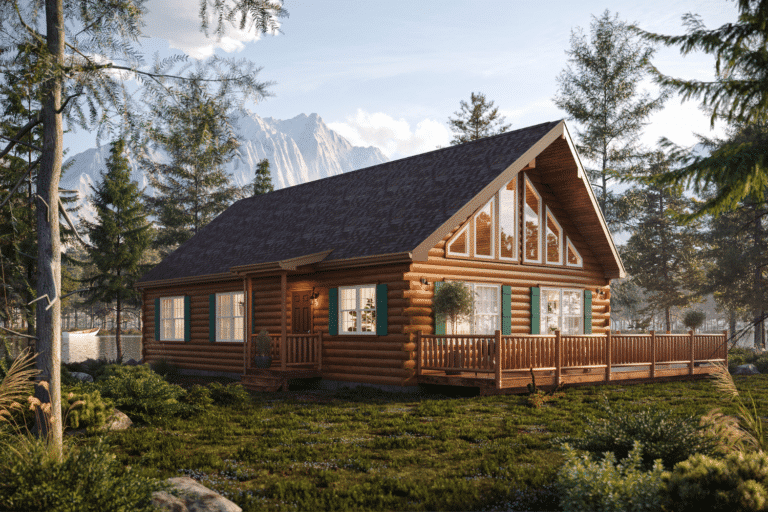
The Chalet
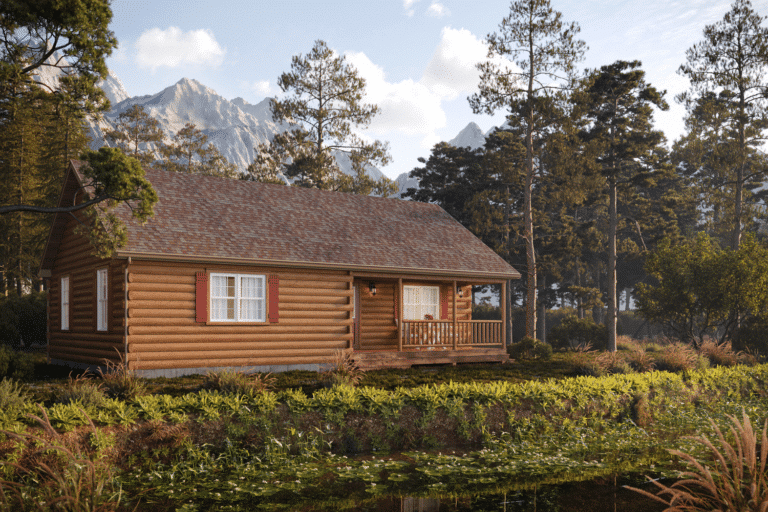
The Frontier
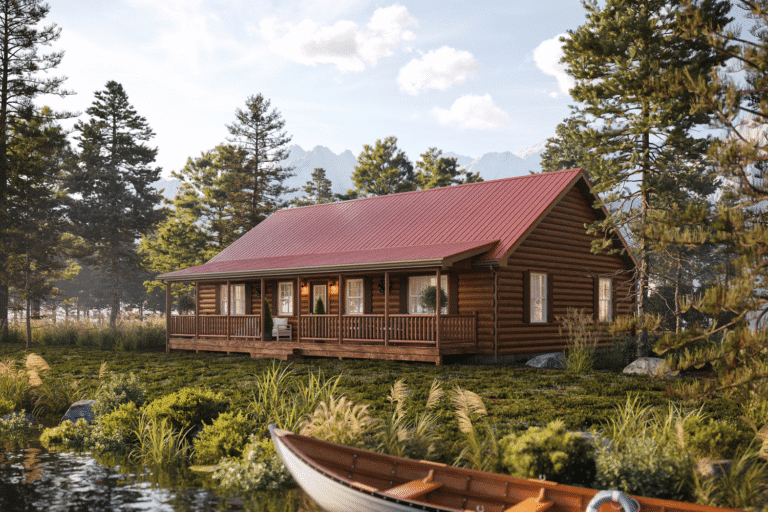
The Musketeer
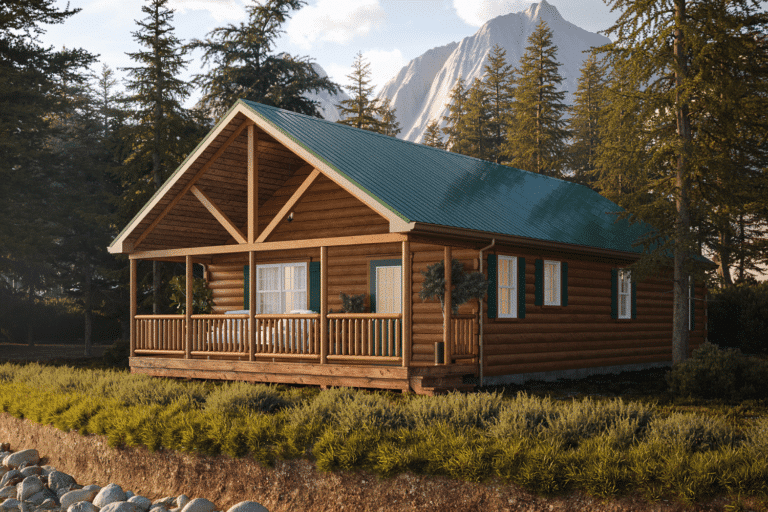
The Settler
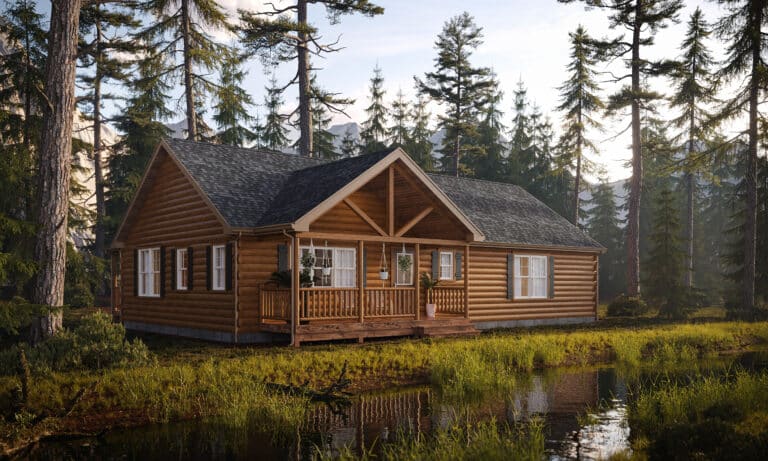
The Pioneer
Can Modern Cabins Be Used As ADUs?
Yes, Modern Cabins can be used as ADUs if they meet the applicable size and placement requirements.
In Florida, ADUs are typically between 800 and 1,200 square feet, though some jurisdictions allow larger or require smaller units. We think this makes the Rio Grande and Two Pines Cabins great options. Before you get started on building your ADU always confirm local regulations with your permitting authority to ensure they comply.
Below are some of our modern cabins designed within the 800–1,200 square foot range.

The Two Pines

The Rivara

The Walden Stack
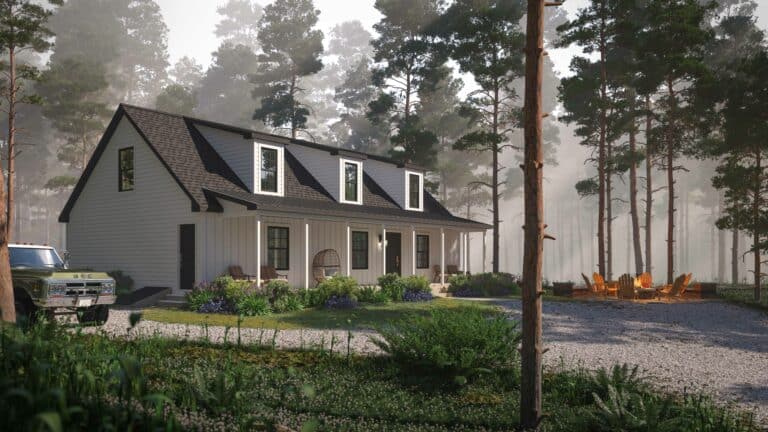
The Homestead
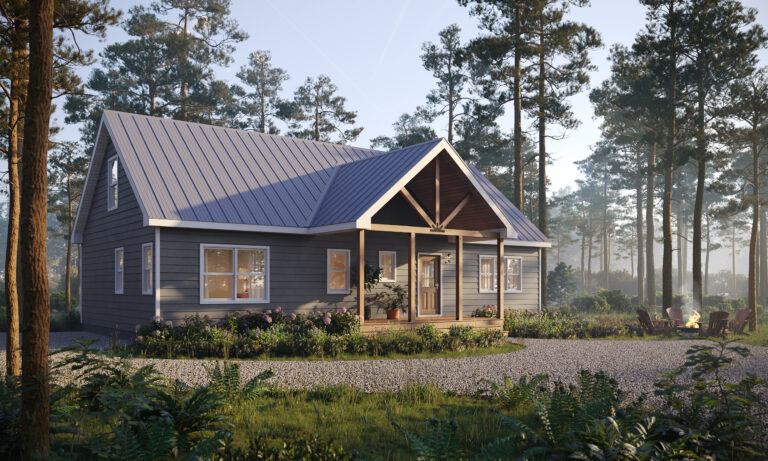
The Franklin
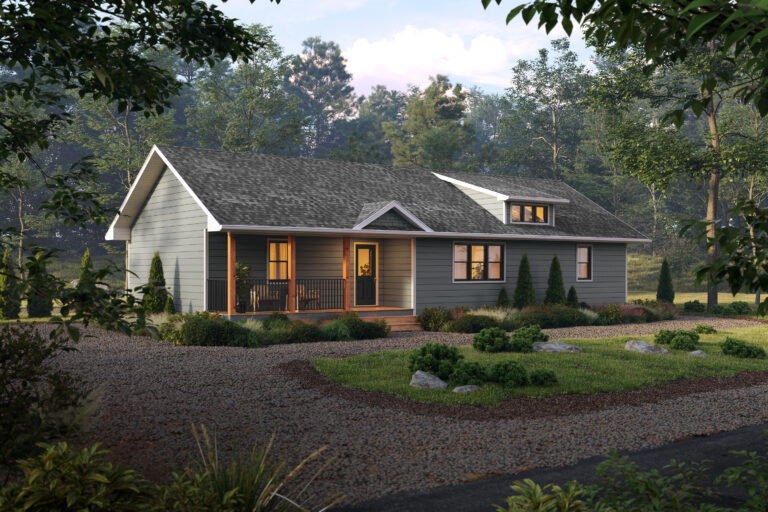
The Woodland
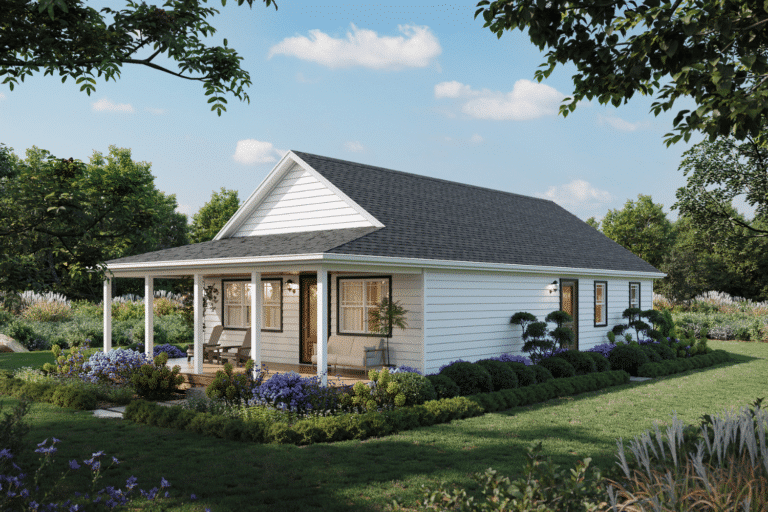
The Beck
What is the Difference Between a Prefab ADU & a Modular ADU?
*This is our 1-bedroom A-frame ADU*
The difference between prefab and modular ADUs is in how they are constructed.
Prefab ADUs are built completely off-site and then delivered to your site fully assembled. Some shed companies may construct prefab ADUs like the ones offered by South Country Sheds. These are great if you want to capitalize on having a temporary dwelling quickly. However, these units will not appreciate like a typical house.
On the other hand, modular ADUs are built in sections off-site, but fully assembled on-site. Unlike prefab ADUs, these structures will appreciate like a house. In some cases, it may even be parcelled off and sold as a separate residence.
To learn more about the differences between the two, check out our guide on prefab and modular ADUs.
Size & Placement Requirements for ADUs in Florida

In many cases, an ADU is much like a typical home. What sets it apart is that it’s located on a property with an existing primary dwelling and is subject to specific sizing requirements. Below, we’ll cover these distinctions in more detail.
What is the Minimum Size for an Accessory Dwelling Unit?
In most cases, Florida has a minimum ADU size of 400 square feet.
However, the minimum size for an accessory dwelling unit in Florida depends on your local jurisdiction. In some areas, the minimum square footage is calculated as a percentage of the primary residence.
For example, an ADU might be required to be no more than 25% of the main home’s total square footage. Because these requirements vary, it’s important to check with your local planning or zoning department for specific size regulations in your area.
If you are restricted to a space that is 400 square feet or less, our ADUs will not be able to accommodate your needs. However, if park model homes are allowed in your area for ADUs, they can be an excellent fit for your needs
Can My ADU be Bigger Than My House?
No, an ADU cannot be larger than the primary structure on your property. In many areas, ADUs are also restricted to a maximum square footage, often calculated as a percentage of the size of the main home.
How Close to My House Can I Build An ADU?
In most cases, Florida does not allow ADUs to be closer than 10 feet from the primary dwelling.
However, the exact placement requirements for an ADU in relation to the principal structure can vary depending on where you live within the state. Be sure to contact your local planning, zoning, or building department to determine their specific requirements.
Do You Need A Permit For An ADU in Florida?
Yes, you will likely need building and zoning permits to add an ADU to your Florida property.
The specific permits required can vary depending on your local jurisdiction. Some areas have permits tailored specifically for ADUs. In contrast, others may only require standard zoning and building permits to ensure your property is appropriately zoned and that the unit complies with local ADU regulations.
Are There Any Incentives or Grants for ADUs in Florida?
Yes. For example, the city of Largo has an ADU grant program that provides up to $8,000.
Some other cities and towns in Florida offer grants or other forms of financial assistance to help homeowners add an accessory dwelling unit to their property. In general, these programs are specific to the city or town where you live, so it’s important to check with your local officials to see what options may be available.
What Features are Included in An ADU from Zook Cabins?

While specific features vary by model, our ADUs offer a range of modern designs with various floor plans, allowing you to select the one that best fits your needs. Each unit comes fully finished on the interior, including a kitchen, bedroom, and bathroom space. To learn more about each model, check out our ADU page.
It’s important to note that certain interior features, such as countertops, tile work, and cabinet colors, have some options to tailor your home to your taste. Talk to your sales representative to learn more about available customization options.
Are Zook Cabin’s ADUs Built to Code?
Yes, all of our ADU models are built to meet or exceed local sizing and room requirements for accessory dwelling units. These homes are built like modular homes, meaning that they will require a permanent foundation.
If you have questions about what foundation is best for your needs, we will be happy to answer them.
Can an ADU Have Multiple Bedrooms and Bathrooms?
Yes, many ADUs feature multiple bedrooms and bathrooms. For example, our Grove, Luna, and A-frame models offer layouts with 1–2 bedrooms and bathrooms. However, it’s important to note that the exact number of rooms that can fit in an ADU will ultimately depend on your area’s size restrictions and zoning requirements.
Are ADUs A Good Investment?

Absolutely! ADUs are often used as rental units and can be a great source of income. In some areas, financing options are available for building an ADU, and you may even be able to resell it later for additional profit. Be sure to check your local regulations to see if there are any financial incentives that could make adding an ADU to your property an even better investment in a second source of income.
What Are the Requirements for ADUs in Each County in Florida?

Below is a list of all 67 counties in Florida, along with the appropriate government officials to contact regarding ADU requirements in each county. Keep in mind that ADU regulations, including size limits, permitted structures, available grants or loans, and other requirements, can vary significantly depending on your location. Contact your local department to learn more about the specific ADU rules in your area.
It’s also important to note that in many cases, city or town officials have the final authority on ADU regulations. If you live within a city or town, be sure to check with your municipal planning or zoning department first to determine if any local ADU ordinances are in place. You can skip the county list below if you already know your local jurisdiction.
If you live in an unincorporated area, or if your city or town does not have specific ADU requirements, refer to the officials listed below for guidance at the county level.
Does Alachua County Allow ADUs?
Yes, Alachua County, FL, permits accessory dwelling units as long as they are in the following residential zoning districts: A, RE, RE-1, R-1aa, R-1a, R-1b, and R-1c. Additional requirements for ADUs within the county include:
- Maximum ADU Size: 1700 square feet or 50% of the principal structure, whichever is larger
- Setbacks: Varies by zoning district
To learn more about ADU requirements in the county, visit their accessory dwelling unit page. If you have any questions or want to obtain the proper permits, contact the county Code Administration. They will be able to provide you with the most up-to-date information on ADU requirements within the county.
Does Baker County Allow ADUs?
It is unclear whether Baker County permits ADUs, as their code of ordinances does not mention them. This likely means that ADU regulations are set by city or town officials within the county. In this case, it’s best to check with your local city or town officials first to determine their requirements. If you reside in an unincorporated area or your city or town has no specific rules, contact the Baker County Community Development Department to find out whether ADUs are allowed.
Does Bay County Allow ADUs?
Bay County’s land development regulations do not specifically mention accessory dwelling units, making it unclear whether they are allowed or what requirements may apply. In most cases, local city or town officials determine if ADUs are permitted and set any related requirements.
We recommend first checking with your municipality to learn about their specific rules. If your municipality has no regulations or you live in an unincorporated area, contact the Bay County Code Enforcement Department to determine whether ADUs are allowed and what requirements may apply.
Does Bradford County Allow ADUs?
Accessory dwelling units (ADUs) are permitted in Bradford County, Florida as long as they are located 50 feet from any side or rear property lines, they meet Florida’s building codes and obtain a proper building permit. They are only permitted in single-family residential districts. Contact the Bradford County Zoning Department to learn about exact sizing, placement, and structure requirements.
Does Brevard County Allow ADUs?
It appears that, as of now, Brevard County does not permit accessory dwelling units by right. While special exceptions may exist, the county does not clearly outline general permissions for ADUs that simply comply with building codes. However, Brevard County is actively working on developing specific regulations for ADUs that will align with Florida state law, so this may change in the near future.
It’s important to note that the allowance of ADUs varies between cities and towns within the county. For example, the City of Cocoa does not permit ADUs, while the City of Palm Bay allows them in residential zoning districts. This is why it is crucial to contact your local planning, building, or zoning officials to determine the rules that apply in your area.
If you live in an unincorporated area or if you want clarification on county-wide requirements, contact the Brevard County Planning & Development Department for more information.
Does Broward County Allow ADUs?
Yes, accessory dwelling units are permitted in certain zoning districts in Broward County. However, the specific requirements often vary because they are typically set by local authorities. It is important to first check with your city or town officials to understand the rules regarding the type of structure, size, and placement for ADUs. If you live in an unincorporated area and would like more information about Broward County’s requirements, contact the County Code Compliance Department.
Does Calhoun County Allow ADUs?
There are no clearly set guidelines for accessory dwelling units in Calhoun County, Florida. The county does seem to allow “guest houses,” but the definition is pretty limited. It only mentions that a guest house is meant for non-paying guests and must be an accessory building to a primary structure. To find out what is allowed in your area, start by contacting your local city or town officials. If you live in an unincorporated area or cannot find any specific requirements, reach out to the Calhoun County Planning Department.
Does Charlotte County Allow ADUs?
According to the current Charlotte County zoning ordinance, accessory guest units are permitted. However, the definition is pretty limited and may not match what most people think of as a traditional accessory dwelling unit. In fact, there are proposals under consideration that would create more detailed regulations for ADUs in the county.
At this time, it is best to contact your city or town zoning or building department to find out if they allow ADUs and what their specific requirements are. If you live in an unincorporated area or want to learn more about the county’s current ADU regulations, reach out to the Charlotte County Community Development Department.
Does Citrus County Allow ADUs?
Yes, according to the land development code, Citrus County permits guest cottages and garage apartments with living units, which they classify as ADUs. Requirements for these structures are as follows:
- Maximum Size: 850 square feet
- Number Per Lot: 1
It’s important to note that exact square footage requirements may vary depending on the size of the property. Also, in many cases, city or town officials are allowed to set their own requirements for ADUs. If you live within a city or town’s jurisdiction, it is essential to check with them to find out what their specific ADU rules are.
If you reside in an unincorporated area or want to learn more about county requirements, contact the Citrus County Code Compliance Department.
Does Clay County Allow ADUs?
Yes, Clay County permits accessory dwelling units, provided that a conditional use permit is obtained and that the structure meets the county’s ADU requirements. These requirements include:
- Permitted Zoning Districts: PUD, AG, AR, AR-1, AR-2, RA, RB, and RE
- Number Per Property: 1
- Minimum Lot Size: 15,000 square feet
- Appearance: Must match principal structure
- Minimum Size: 375 square feet
- Maximum Size: 40% of principal structure’s gross floor area or 1,000 square feet, whichever is less
- Maximum Lot Coverage: 35%
Please check with your city or town to find out if they have their own regulations. If you have any questions about county-wide requirements, contact the Clay County Code Enforcement Department.
Does Collier County Allow ADUs?
Collier County does allow guesthouses on single-family residential properties, but the rules may not fully align with what is commonly considered an ADU. For example, guesthouses are not permitted to be rented or leased to other occupants. They must also be located on a lot with a minimum of 43,560 square feet; the maximum floor area cannot exceed 40% of the principal dwelling, and they must be set back at least 20 feet from the principal dwelling.
To learn more about guesthouses versus ADUs in the county, contact the Collier County Code Enforcement Division. It is also important to note that city and town officials can enforce their own regulations, so you should check with your local planning, zoning, or building department to find out if ADUs are allowed in your area.
Does Columbia County Allow ADUs?
It is unclear whether or not Columbia County, Florida, allows accessory dwelling units. As city and town officials often set their own regulations regarding ADUs, we recommend that you contact your local planning, building, or zoning department to find out what they allow. If you reside in an unincorporated area, contact the Columbia County Code Enforcement Department to find out what their requirements are.
Does DeSoto County Allow ADUs?
Yes, DeSoto County allows one accessory dwelling unit per property. However, there are specific requirements for what they call an accessory apartment or garage apartment. Accessory apartments must be connected to the principal structure by a breezeway, roofed passage, or similar structure. Additionally, both apartments cannot exceed 25% of the gross floor area of the principal structure.
Some cities and towns enforce their own ADU regulations, so it is important to verify requirements with your local planning, building, or zoning department first. If you live in an unincorporated area, contact the DeSoto County Code Enforcement Department to learn more about additional requirements such as permits, setbacks, and size limitations.
Does Dixie County Allow ADUs?
It appears that ADUs are not permitted in Dixie County. References to accessory buildings, guest houses, and servant quarters all state that these structures may not be used as permanent residences or for home occupation purposes. For more clarity on what is allowed, contact Dixie County Community Development Services.
It is important to note that cities and towns may enforce their own regulations regarding ADUs, so be sure to confirm rules and restrictions with your local planning, zoning, or building department.
Does Duval County Allow ADUs?
Duval County does not have an official website, and its code of ordinances is not available online, making it unclear what the county allows regarding ADUs. However, the city of Jacksonville, the county seat, does permit them. Keep reading to learn more about ADU requirements within certain cities and towns in Duval County.
Escambia County, FL, ADU Requirements
It is unclear if Escambia County permits accessory dwelling units. Regulation of ADUs is likely handled by individual cities or towns. We recommend first contacting your local building, planning, or zoning department to determine if any local ordinances apply. If you live in an unincorporated part of the county and are curious about the regulations that apply to you, contact Escambia County Development Services.
Does Flagler County Allow ADUs?
The Flagler County Code of Ordinances does not specifically mention accessory dwelling units; it only addresses accessory buildings or structures. It is unclear if ADUs fall under this category or if the code is solely referring to sheds, garages, and other detached structures. The code does outline provisions for guest or servant quarters, allowing detached accessory buildings to be used for housing, but only for guests or other inhabitants of the principal structure, not for renting or selling.
For clarification on whether ADUs are allowed and what specific requirements apply, contact the Flagler County Planning & Zoning Division. Keep in mind that cities and towns often set their own ADU ordinances, so be sure to verify requirements with your local planning, zoning, or building department.
Does Franklin County Allow ADUs?
There are no clearly defined regulations regarding ADUs in the Franklin County code of ordinances. Since this is the case, it’s recommended that you first check with your local building, planning, or zoning department to find out what they allow. If you reside in an unincorporated area, you can contact Franklin County Planning Services to find out if they allow ADUs and what their requirements are.
Does Gadsden County Allow ADUs?
Gadsden County, Florida, does allow accessory dwelling units. The following requirements apply:
- The ADU and the principal structure must be owned by the same person.
- The property must be at least 1 acre in size to add an ADU.
- A building permit is required before construction.
- Only one ADU is allowed per property.
- The design of the ADU must match that of the principal structure.
- The ADU must meet the same setback requirements as the principal structure.
- It must be located in the rear or side yard.
- The ADU may not exceed 80% of the livable area of the principal dwelling.
- It cannot be taller than the principal structure.
- It must have a separate utility meter from the main residence.
- Park model tiny homes are not permitted as ADUs.
To learn more about setbacks and design standards, or to ensure compliance with the state building code, contact the Gadsden County Code Enforcement Office. If you reside within a city or town’s jurisdiction, check with the local planning or zoning department first, as municipal rules may take precedence over county regulations when it comes to ADUs.
Does Gilchrist County Allow ADUs?
It appears that accessory dwelling units are permitted in Gilchrist County, but only on agriculturally zoned properties. The following requirements apply:
- Construction: Unit must be site-built or modular
- Number Per Lot: 1
- Minimum Lot Size: 10,000 square feet in size and 100 feet in width
- Setbacks: No less than 15 feet and no more than 75 feet from the principal structure
- Minimum Size: 400 and 1,000 square feet in size.
- Permits: A building permit is required before construction
Additional requirements may apply, so it is important to consult Gilchrist County’s Code Enforcement Department. Keep in mind that many cities and towns enforce their own ADU regulations, so contact your local building, planning, or zoning department to determine which rules apply to your location.
Does Glades County Allow ADUs?
It appears that Glades County may allow accessory dwelling units. While the county code does not explicitly mention “ADUs,” it does define garage apartments and guesthouses, which serve a similar function. For example, a guesthouse may be located on the same property as a principal structure, provided it does not exceed 50 percent of the habitable area of the primary structure.
Guesthouses cannot be rented and must be owned by the same person who owns the principal residence.
To confirm whether ADUs are permitted and to learn about specific requirements, contact the Glades County Community Development Department. Some cities and towns may enforce their own ADU regulations, so be sure to check with your local planning, zoning, or building department as well.
Does Gulf County Allow ADUs?
It appears that Gulf County may permit accessory dwelling units, provided they comply with the Florida Building Code. However, the county’s code of ordinances does not clearly outline specific requirements or restrictions for ADUs. For clarification on what is allowed in your area, contact your local officials or the Gulf County Planning & Development Department.
Does Hamilton County Allow ADUs?
You can likely have an accessory dwelling unit in Hamilton County, Florida. The county provides guidelines for a guest house or cottage, which is similar to what is typically considered an ADU, though there are some important distinctions. For instance, it cannot be rented out, and it may not include any cooking facilities. Because these rules do not perfectly align with the traditional definition of an ADU, we recommend contacting the Hamilton County Planning, Land Use, and Zoning Department for clarification. Additionally, cities and towns often enforce their own regulations, so be sure to check with your local officials to determine their specific ADU requirements.
Does Hardee County Allow ADUs?
Yes, accessory dwelling units are permitted in Hardee County, Florida. The requirements for them are as follows:
- Permitted Zoning Districts: R-0.5, R-1, FR-2.5, F-R, FR-2, and A-1
- Number Per Lot: 1 in residential zones
- Park Model Tiny Homes Are Not Permitted As ADUs
- Maximum Size: 40% of the principal structure’s square footage or 800 square feet, whichever is less
- Minimum Size: 300 square feet
- Number of Rooms: No more than 2 bedrooms
Other requirements may apply, and regulations can change, so we recommend contacting the Hardee County Community Development Department to confirm the current ADU standards. Because cities and towns often enforce their own regulations, be sure to check with your local officials to determine their specific requirements as well.
Does Hendry County Allow ADUs?
In Hendry County, Florida, you can have one accessory dwelling unit per residential property. There may be additional requirements you must meet, so we recommend contacting the Hendry County Planning & Zoning Department to confirm what is currently allowed. Some cities and towns often have their own regulations, so check with local authorities to find out if any additional ADU requirements apply.
Does Hernando County Allow ADUs?
You can have an accessory dwelling unit in Hernando County, Florida, provided you meet the following requirements:
- Number Per Property: 1
- Maximum Floor Area: 50% of the primary dwelling’s gross floor area
- Setbacks: all applicable placement and setback requirements must be met
- Detached or attached: must share a wall or breezeway with the principal structure
To learn more about these requirements or confirm current ADU regulations, contact the Hernando County Zoning Department. Local municipalities may enforce their own ADU regulations, which take precedence over county rules, so be sure to check with your local officials as well.
Does Highlands County Allow ADUs?
It appears that accessory dwelling units may be permitted in Highlands County, Florida. However, the county refers to these as “accessory structures,” such as guest houses, and they are not defined in the same way as traditional ADUs. For example, they are not allowed to be rented, and there are no defined square footage limits similar to typical ADU standards.
For clarification on what is permitted, we recommend contacting your local city or town officials first, as they may be primarily responsible for regulating ADUs. You can also contact Highlands County Development Services to learn more about county-level requirements.
Does Hillsborough County Allow ADUs?
Hillsborough County has specific standards for accessory dwelling units, including:
- Minimum Lot Size: 7,000 square feet
- Maximum ADU Size: 900 square feet
- A variance may be requested to allow an ADU up to 1,200 square feet or 25% of the principal structure’s living space (whichever is less), provided the residential lot is at least 14,520 square feet.
- Setbacks: same as the principal structure.
Additional requirements may apply. We recommend contacting Hillsborough County Development Services to ensure your proposed ADU meets all applicable regulations. City and town officials often establish their own rules, so be sure to check with local authorities as well to confirm any municipal ADU requirements.
Does Holmes County Allow ADUs?
It is unclear if accessory dwelling units are permitted in Holmes County, Florida. If you live in an unincorporated area, we recommend contacting the Holmes County Building, Planning, and Zoning Department for guidance. For those residing within city or town limits, reach out to your local officials to find out if ADUs are allowed and what their specific requirements are.
Does Indian River County Allow ADUs?
You can have an accessory dwelling unit on a residentially zoned lot in Indian River County, Florida. The criteria for ADUs in the county are as follows:
- Number of ADUs Per Lot (of 200,000 sq. ft. or less): 1
- Maximum Size for ADUs on Properties of 1 acre or less: 50% of the heated or enclosed gross floor area of the principal structure or 1,200 square feet, whichever is less.
- Minimum Square Footage: 300
- Appearance: Must match the appearance of the principal structure, unless it is a converted garage ADU
Other requirements may apply. We recommend contacting the Indian River County Planning & Zoning Commission for detailed information. Additionally, because local officials are allowed to establish their own ADU regulations, be sure to confirm the requirements with your city or town officials before moving forward with your project.
Does Jackson County Allow ADUs?
Jackson County permits accessory dwelling units on the same property as a primary single-family or duplex dwelling unit, provided that:
- Number of ADUs Per Property: 1
- Placement: Detached ADUs must be located in the side or rear yard
- Maximum Square Footage: 50% of the area of the principal structure
- Maximum Height: No taller than two stories
Additional requirements may apply. Be sure to confirm that your ADU complies with all regulations and that the proper permits are obtained before beginning construction. ADU information and permits are available through the Jackson County Community Development Department. Cities and towns often have their own ADU requirements as well, so if you reside within city or town limits, check with your local officials first.
Does Jefferson County Allow ADUs?
It appears that accessory dwelling units are permitted in certain zoning districts within Jefferson County. For example, mixed-use districts allow ADUs, and “accessory apartments” are permitted in residential districts. However, the specific requirements for these units are not clearly outlined, so we recommend contacting the Jefferson County Planning Department to determine what rules and restrictions may apply to your property.
Cities and towns often have their own ADU regulations, so be sure to check with your local officials as well to ensure full compliance.
Does Lafayette County Allow ADUs?
It is unclear if accessory dwelling units are permitted in Lafayette County. However, the City of Lafayette has introduced legislation to allow them, so ADU regulations may vary depending on the city or town where you live.
We recommend starting by contacting your local planning, zoning, or building department to determine the ADU requirements for your property. If you live in an unincorporated area, you can reach out to the Lafayette County Building Department for guidance.
Does Lake County Allow ADUs?
Lake County does permit accessory dwelling units, provided they meet the following requirements:
- Number of ADUs Per Lot: 1
- Maximum ADU Size: 1,300 square feet or 70% of the principal structure’s living area, whichever is greater
- Appearance: Matches/in harmony with the principal structure
- ADU Foundation/Anchoring: Must be placed on a solid foundation with permanent skirting, and any wheels or transport mechanisms must be removed
Additional requirements may apply, so be sure to contact the Lake County Planning & Zoning Department to ensure compliance. Cities and towns may enforce their own ADU regulations, so be sure to check with local officials as well.
Does Lee County Allow ADUs?
You can have one accessory apartment or dwelling unit per principal single-family residence on your property. It must not exceed 50% of the living area of the primary structure, and its appearance must match the design of the main residence.
Additional requirements may apply, so we recommend contacting the Lee County Community Development Department to ensure full compliance. Local officials may have their own rules and restrictions, so be sure to confirm ADU requirements with them as well.
Does Leon County Allow ADUs?
Accessory dwelling units are permitted in Leon County, provided they meet the following requirements:
- Location: Side or rear portion of the property
- Setbacks: 50 feet from the rear property line and 30 feet from front and side corner property lines
- Maximum Size: 800 square feet
- Permits: Must obtain all required permits
ADUs must comply with applicable height, placement, setback, and other building code regulations. To ensure full compliance, contact Leon County Development Services. Additionally, check with your city or town officials, as local jurisdictions may have their own ADU regulations.
Does Levy County Allow ADUs?
Levy County allows accessory dwelling units, provided the following requirements are met:
- Permits: ADU affidavit and a building permit
- The affidavit must be secured before the building permit will be issued
- Setback & Other Placement Requirements: Must comply with requirements for the zoning district in which it is located
- Maximum ADU Size: 50% of the floor area of the principal dwelling or 1,200 square feet, whichever is greater
Additional requirements may apply. Contact the Levy County Planning & Zoning Department to confirm current regulations. If you live within city or town limits, check with your local officials, as they may have their own ADU requirements.
Does Liberty County Allow ADUs?
It is currently unclear whether Liberty County permits accessory dwelling units. To find out if they are allowed and what requirements may apply, contact your local building, planning, or zoning officials. If you live in an unincorporated area or want to confirm county-wide regulations, reach out to the Liberty County Planning & Zoning Department.
Does Madison County Allow ADUs?
Madison County permits accessory dwelling units or accessory apartments in residential zoning districts. However, the exact requirements are unclear. To learn more about adding an ADU to your property, contact the Madison County Planning & Zoning Department. Some cities and towns within the county may enforce their own regulations, so be sure to check with your local officials as well.
Does Manatee County Allow ADUs?
Manatee County permits accessory dwelling units in the following zoning districts: A, A-1, RSF, PD, and within the Village Zoning Districts.
However, ADUs are prohibited in the Whitfield Residential Overlay District and the Bayshore Gardens Park & Recreation District.
Both detached ADUs and garage apartments are permitted. Detached ADUs must meet the following development standards:
- They must be set back a minimum of 10 feet from the rear property line if they include obscure glass windows facing neighboring properties, or if the windows are screened by foliage or fencing. Alternatively, the unit may have a maximum height of 12 feet and be limited to one story with no lofts.
- In RSF, PD, and Village (VIL) zoning districts, a detached ADU must not exceed 750 square feet or 80% of the principal structure’s floor area, whichever is less.
- In A and A-1 zoning districts, a detached ADU must not exceed 1,000 square feet or 80% of the primary structure, whichever is less.
Additional requirements may apply. Contact the Manatee County Planning, Development, and Zoning Department to confirm current ADU standards. Cities and towns within the county may enforce their own zoning rules, so be sure to check with your local officials to ensure full compliance.
Does Marion County Allow ADUs?
While Marion County does not specifically define accessory dwelling units, it does allow for guest cottages or apartments that serve a similar purpose. These structures are considered accessory, non-commercial dwelling units (ADUs) that are smaller than the principal structure and often share utility connections with the main home. They must be built on a concrete foundation or slab and must be located in the rear or side yard of the principal dwelling.
To learn more about guest cottage or apartment requirements, contact the Marion County Code Enforcement Department. Cities and towns may enforce their own requirements, so be sure to check with local officials as well.
Does Martin County Allow ADUs?
Accessory dwelling units are permitted in Martin County, provided they adhere to the following development standards:
- Maximum Size: 850 square feet or half the square footage of the primary dwelling, whichever is less.
- Utilities: Must be separate or shared with the principal structure
- It cannot be sold separately from the primary dwelling.
- It must be located on a lot with a detached single-family home or townhouse, not a duplex.
Additional requirements may apply, so be sure to confirm your ADU specifications with the Martin County Code Enforcement Department. Because cities and towns may have their own ADU regulations, you should also check with local officials before proceeding.
Does Miami-Dade County Allow ADUs?
You may have an accessory dwelling unit in Miami-Dade County if you comply with the following requirements:
- Number Per Property: 1
- Rental Status: Can be rented
- Attached or detached?: Either
- Permits: A renewable Certificate of Use is required
- An exterior inspection is required each time the certificate is renewed
- A one-time interior inspection is required
- Height: If detached, no taller than the principal structure
- Park model tiny homes cannot be used as ADUs
- Permitted Zoning Districts: AU, EU, and RU zoning districts, or in GU zoning districts that are designated for AU, EU, or RU
- Minimum Property Size: 7,500 square feet
- Sizing Requirements in RU-1 Zoning Districts: Between 400 and 800 square feet
- Permits: A building permit is required for construction
For information on setback requirements, additional regulations, or to apply for a Certificate of Use, contact Miami-Dade County Regulatory Resources. Note that cities and towns within the county may have their own ADU rules, so contact your local jurisdiction first to ensure full compliance.
Does Monroe County Allow ADUs?
You can have an ADU in Monroe County, but it must meet the following requirements:
- Permits: A permit must be obtained
- Number of Occupants: As established in this chapter
- Minimum Lot Size: 3,000 square feet.
- Maximum Size: 800 square feet or 40% of the floor area of the principal structure
- Number of Rooms: No more than 2 bedrooms.
Additional requirements may apply, so contact Monroe County Code Compliance to ensure your ADU meets all applicable codes. Cities and towns within the county may enforce their own ADU regulations, so be sure to check with local officials as well.
Does Nassau County Allow ADUs?
Nassau County permits accessory dwelling units provided the following conditions are met:
- Appearance: Must match the architectural design and construction standards of the principal structure.
- Park model tiny homes may not be used as ADUs.
- Setbacks: Must comply with requirements of the applicable zoning district.
- Max Height: 25 feet.
- Max Size: 800 square feet or 50% of the square footage of the primary home, whichever is less.
Additional regulations may apply. Contact the Nassau County Planning Department to ensure your ADU meets all county requirements. If your property is located within a city or town, local ADU rules may override county standards, so be sure to consult with your municipal planning office before proceeding.
Does Okaloosa County Allow ADUs?
While Okaloosa County does not specifically reference accessory dwelling units, it does permit guest houses and garage apartments, which generally align with ADU standards. The following conditions apply:
- Only one unit is allowed per parcel
- Guest houses may be detached or attached to the principal structure via a breezeway
- The unit must not be larger than the principal structure on the lot
Additional requirements may apply, or the unit you plan to build may need to follow standards different from those for guest houses. To ensure compliance, contact Okaloosa County Growth Management before starting your project.
Cities and towns within the county may have their own ADU regulations that take precedence, so be sure to consult local officials before finalizing your plans.
Does Okeechobee County Allow ADUs?
Okeechobee County permits accessory apartments in residentially zoned areas. These are similar to accessory dwelling units and must meet the following requirements:
- Number Per Lot: 1
- Location: Within the principal structure
- Maximum Size: 25% of the gross floor area of the principal structure
While these requirements are similar to those for ADUs, they do not fully align with standard ADU definitions. We recommend contacting the Okeechobee County Community Development Department to confirm whether your planned accessory dwelling unit is permitted.
Additionally, cities and towns within the county may enforce their own ADU ordinances. Be sure to check with local officials before moving forward.
Does Orange County Allow ADUs?
Orange County permits both attached and detached accessory dwelling units. Specific requirements may vary depending on the type of ADU you plan to build. Key regulations include:
- Number Per Lot: 1
- Maximum Living Area: 50% of the primary dwelling’s size or 1,000 square feet, whichever is less
- Height: Must not be taller than the primary dwelling
- Appearance: Must match the architectural appearance of the principal structure
For detailed requirements, contact the Orange County Planning & Development Department. You can also find permitting information for ADUs on the county’s official website.
Keep in mind that municipalities within Orange County may have their own ADU regulations, which take precedence. Always check with local officials to ensure your project is fully compliant.
Does Osceola County Allow ADUs?
There are specific requirements such as minimum size, design standards, and setback rules. However, they are not clearly outlined in the available documentation.
To ensure your ADU complies with all applicable regulations, contact Osceola County Code Enforcement directly. Additionally, cities and towns within the county may enforce their own ADU requirements, so be sure to check with local officials as well.
Does Palm Beach County Allow ADUs?
Palm Beach County permits accessory dwelling units, provided they meet the following requirements:
- Number of Units: One ADU per lot
- Maximum Floor Area:
- For properties less than 1 acre: up to 800 square feet
- For properties 1 acre or more: up to 1,000 square feet
- For properties less than 1 acre: up to 800 square feet
- Number of Bedrooms/Bathrooms: Limited to one bedroom and one bathroom
Additional requirements may apply. To ensure full compliance, contact the Palm Beach County Planning, Zoning & Building Department.
Keep in mind that municipalities within the county may have their own ADU regulations, so be sure to check with local officials as well.
Does Pasco County Allow ADUs?
It appears that Pasco County is in the process of developing specific accessory dwelling unit legislation. However, no clear regulations regarding ADUs are currently in place. To inquire about the status of ADU laws within the county, contact Pasco County Planning & Development Services. Cities and towns within the county may have clearer legislation in place, so be sure to also check with your local officials.
Does Pinellas County Allow ADUs?
Pinellas County permits accessory dwelling units and has actually recently updated its ADU requirements as of early 2024. Current regulations include:
- Maximum ADU Size: 1,000 square feet, unless located in a Coastal Storm Area
- Number of ADUs Per Lot: 1
- Park model tiny homes are not permitted as ADUs
- Setbacks: Must comply with zoning district requirements
To ensure your ADU meets all applicable regulations, contact Pinellas County Planning & Zoning Services. Additionally, local municipalities may enforce their own ADU requirements, which take precedence over county rules, so be sure to consult with local officials as well.
Does Polk County Allow ADUs?
Yes. Polk County outlines the following requirements for accessory dwelling units:
- Number of ADUs Per Lot: 1
- Setbacks: Must comply with the county’s accessory structure setback requirements
- Minimum and Maximum Square Footage Requirements: Not clearly specified
For clarification on the exact standards your ADU must meet, contact the Polk County Planning & Development Department. Municipalities within the county may enforce their own regulations, so be sure to check with local officials as well.
Does Putnam County Allow ADUs?
Putnam County permits accessory dwelling units in AE, AG, RE, R-1, and R-2 zoning districts with a special use permit, as well as in certain commercial zoning districts. To add an ADU to your property, the following requirements must be met:
- Minimum Lot Size: 1 acre (unless the parcel is served by central water & sewer)
- Number of ADUs Per Property: 1
- Park Model Tiny Homes Are Not Permitted To Be Used As ADUs
- Minimum ADU Size: 400 square feet
- Maximum ADU Size: 1,000 square feet
- Number of Rooms: 1 bedroom
- One additional bedroom may be allowed with a special use permit from the zoning board.
It’s always best to contact Putnam County Planning & Development Services to ensure your ADU complies with all county requirements.
Additionally, cities and towns within the county may enforce their own ADU regulations, so be sure to confirm with local officials before proceeding.
Does St. Johns County Allow ADUs?
St. Johns County allows accessory family units, similar to accessory dwelling units. These structures must meet the following conditions:
- Must be lived in by family members of the primary dwelling unit owner
- Maximum ADU Size: 35% of the primary structure’s square footage or 2,000 square feet, whichever is less. However, it can be at least 800 square feet, even if 35% of the primary structure’s square footage is less than that.
Additional requirements apply, as these structures are not considered full dwelling units. Be sure to check with the St. Johns County Planning & Zoning Department to ensure compliance.
Municipalities can set their own ADU regulations, so check with your local officials as well. However, when you are ready for a quote on an ADU we are here and ready to help you.
Does St. Lucie County Allow ADUs?
It is unclear whether St. Lucie County permits accessory dwelling units. There appear to have been discussions about allowing tiny homes as “accessible dwelling units,” but neither term is currently referenced in the county’s land development code.
For clarification on what is permitted, contact St. Lucie County Code Compliance Services.
Keep in mind that cities and towns within the county may establish their own ADU regulations, so be sure to check with local officials as well to ensure full compliance.
Does Santa Rosa County Allow ADUs?
Santa Rosa County permits accessory dwelling units, which are referred to in local regulations as “guest cottages.” The requirements for guest cottages are as follows:
- Number of Units Per Lot: 1
- Setbacks: Must be set back 60 feet from the front property line, and meet the same side and rear setbacks as the principal structure
- Maximum Square Footage: Cannot exceed 50% of the total floor area of the main dwelling
- Park model tiny homes are not permitted as guest cottages.
Additional requirements may apply, so be sure to contact Santa Rosa County Development Services to ensure full compliance.
Also, note that cities and towns within the county may establish their own ADU regulations, so be sure to confirm compliance with local officials.
Does Sarasota County Allow ADUs?
Sarasota County has been actively working to expand affordable housing options. As part of these efforts, accessory dwelling units are permitted in the RSF, RSF/PUD, and RE zoning districts. ADUs in Sarasota County must meet the following requirements:
- Number of ADUs Per Lot: 1
- Maximum Square Footage: 750 square feet
To ensure your ADU complies with all applicable regulations, contact Sarasota County Code Enforcement.
Please note that cities and towns within the county may enforce their own ADU requirements, so be sure to verify your project specifications with local officials as well.
Does Seminole County Allow ADUs?
Seminole County allows accessory dwelling units, provided they meet the following requirements:
- Minimum Lot Size: 5,000 square feet with a width of 50 feet
- Sizing Requirements: No larger than 35% of the gross floor area of the principle structure or 1,000 square feet, whichever is less
Additional requirements may apply and can vary depending on your zoning district. To ensure full compliance, contact Seminole County Planning & Development Services.
Please note that municipalities within the county may enforce their own ADU regulations, so be sure to confirm with local officials as well.
Does Sumter County Allow ADUs?
Sumter County permits accessory dwelling units in both agricultural and residential zoning districts, subject to the following standards:
- Number of ADUs Per Lot: 1
- Minimum Property Size: ½ acre
- Minimum Square Footage: 400 square feet
- Maximum Square Footage: 40% of the gross floor area of the principal residence
- The ADU must be a site-built structure.
Additional requirements may apply, so be sure to confirm your plans with the Sumter County Planning Division and obtain any necessary permits.
Municipalities within the county may enforce their own ADU regulations, so it’s important to confirm compliance with local officials as well.
Does Suwannee County Allow ADUs?
The Suwannee County Code of Ordinances does not reference accessory dwelling units, making it unclear whether they are permitted within the county. For clarification, contact the Suwannee County Planning & Zoning Department.
Keep in mind that cities and towns within the county may enforce their own ADU regulations, so be sure to check with local officials to determine what rules apply in your area.
Does Taylor County Allow ADUs?
Taylor County does permit accessory dwelling units, but the exact requirements are not clearly defined in available legislation. To determine what regulations apply, contact the Taylor County Planning & Zoning Department.
Keep in mind that cities and towns within the county may enforce their own ADU requirements, so be sure to consult with local officials as well to ensure full compliance.
Does Union County Allow ADUs?
It is unclear whether Union County permits accessory dwelling units. The county does allow guest houses as an accessory use, but these structures are not considered dwelling units, so their requirements do not fully align with those of traditional ADUs.
To clarify what is permitted, you are recommended to contact the Union County Planning & Development Department.
Additionally, cities and towns within the county may enforce their own ADU regulations. If local requirements exist, they will take precedence over county rules, so be sure to check with your local officials as well.
Does Volusia County Allow ADUs?
Volusia County permits accessory dwelling units, provided they meet the following criteria:
- Minimum Square Footage: 240 square feet
- Maximum Square Footage: 50% of the total living area of the principal residence or 1,200 square feet on properties less than 1 acre
- Setbacks: Must meet the same setback requirements as the principal structure
Additional requirements may apply, so be sure to confirm compliance with the Volusia County Planning & Development Division.
Keep in mind that cities and towns within the county may enforce their own ADU regulations, so it’s important to check with local officials as well.
Does Wakulla County Allow ADUs?
Wakulla County permits accessory dwelling units, provided they meet the following requirements:
- Number of ADUs Per Parcel: 1
- Maximum Square Footage: No larger than one-third of the living area of the principal dwelling or 600 square feet, whichever is less
Additional requirements may apply. To ensure full compliance, contact Wakulla County Planning & Community Development.
Note that municipalities within the county may establish their own ADU regulations, so be sure to also check with local officials.
Does Walton County Allow ADUs?
Walton County allows accessory dwelling units in single-family residential areas, so long as all the following requirements are met:
- Number of ADUs Per Lot: 1
- Maximum Square Footage: 800 square feet of heated or cooled area or 75% of the primary dwelling’s livable area
- Park model tiny homes are not permitted to be used as ADUs.
Contact the Walton County Planning & Development Department to certify that your ADU meets all applicable requirements. Be sure to confirm compliance with your city or town officials as well.
Does Washington County Allow ADUs?
Washington County does allow ADUs, provided that they adhere to the following requirements:
- Number of ADUs Per Property: 1
- Setbacks: Must meet requirements outlined in Section 2.03.00 of the Land Development Code
- Maximum Square Footage: 50% of the primary structure’s square footage
- Park model tiny homes are not permitted to be used as an ADU.
All ADUs require a permit. The Washington County Planning Department can provide additional information regarding ADU requirements.
It’s important to note that many cities and towns enforce their own ADU requirements, so be sure to certify compliance with them.
Find Your Accessory Dwelling Unit Requirements in Florida By Municipality

| City | Contact | Allows ADUs? | Minimum Sq. Ft. | Maximum Sq. Ft. |
| Jacksonville | Planning & Development Department | Yes | Unspecified | 750 or 25% of principal structure |
| Lakeland | Planning & Zoning | Yes | 300 | 800 or 40% of principal structure |
| Largo | Community Development | Yes | 400 | 800 or 50% of principal residence |
| Miami | Zoning Department | Yes | Unspecified | Unspecified |
| Orlando | Building & Development Department | Yes | 300 | ≤ 50% of lot area |
| Sarasota | Planning Department | Yes | Unspecified | 650 |
| St. Petersburg | Planning & Zoning Department | Yes | Unspecified | 800 or 67% of principal dwelling |
| Tallahassee | Zoning | Yes | Unspecified | 1,200 |
| Tampa | City Planning | Yes | Unspecified | Unspecified |
What Are the ADU Requirements in Jacksonville, FL?
Accessory dwelling units in Jacksonville, Florida, are subject to the following requirements:
- Maximum Square Footage: 750 square feet or 25% of the gross floor area of the principal structure, whichever is less.
Additional requirements may apply. For more information and to ensure full compliance, contact the Jacksonville Planning & Development Department.
What Are the ADU Requirements in Lakeland, FL?
Lakeland allows accessory dwelling units in urban areas of the city, provided that they meet the following requirements:
- Min. Front Setback: 5’ from front facade of principal structure
- Min. Interior Side Setback: 5’
- Min. Rear Setback: 5’
- Min. Side Street Setback: Same as principal structure
- Max Height: 12 ½ feet
- Min. Living Area: 300 square feet
- Max Living Area: 800 square feet or 40% of the principal dwelling, whichever is less
ADUs require approval from the Planning & Zoning Board and the Historic Preservation Board if they are located within a Historic District.
What Are the ADU Requirements in Largo, FL?
Accessory dwelling units in Largo, Florida, must adhere to the following requirements:
- Location: Can be located in most residential and commercial zoning districts, but are prohibited in Coastal High Hazard Areas or Special Flood Hazard Areas
- Number of ADUs Per Lot: 1
- Park Model Tiny Homes are not permitted as ADUs.
- Setbacks: Same as principle structure
- Maximum Size: 800 square feet or 50% of the living area of the principal residence
- Minimum Size: 400 square feet
Contact Largo’s Community Development Department to ensure full compliance with ADU requirements.
It’s worth noting that the City of Largo offers an ADU grant program, providing additional incentive for property owners interested in adding an accessory dwelling unit. Through this program, the Largo Community Redevelopment Agency (CRA) offers up to $8,000 per property to cover impact and permit fees. To learn more, contact the CRA directly.
What Are the ADU Requirements in Miami, FL?
Miami permits accessory dwelling units; however, specific requirements for size, placement, and setbacks vary depending on your property’s zoning district. To determine what is allowed on your lot, it’s best to contact the Miami Zoning Department to confirm your zoning and review the applicable ADU regulations.
What Are the ADU Requirements in Orlando, FL?
Orlando permits accessory dwelling units, provided that the following requirements are met:
- Number of ADUs Per Lot: 1
- Zoning Districts That Permit ADUs: R-1, R-2, R-3, MXD, O-1, O-2 or PD
- Minimum ADU Size: 300 square feet
- Maximum ADU Size: The max square footage of the house and ADU combined must not exceed 50% of the total square footage of the lot.
To learn more about specific requirements, visit the Orlando ADU page or contact the Building & Development Department.
What Are the ADU Requirements in Sarasota, FL?
If you’re curious about how one of our ADU models could work on your Florida property, contact our sales team today. We’re here to guide you through the process, ensure code compliance, and help you create the housing solution you need.
The requirements for accessory dwelling units in Sarastora are as follows:
- Maximum Size: 650 square feet
- Maximum Height: 24 feet in residential zones; 2 stories in Downtown Neightborhood zone district
- No ADUs are permitted in the Coastal Islands Overlay District
Additional requirements may apply, so be sure to confirm compliance with the Sarasota Planning Department.
What Are the ADU Requirements in St. Petersburg, FL?
ADUs are permitted in Saint Petersburg, Florida, so long as the meet the following requirements:
- Maximum Square Footage: 800 square feet or 67% of the floor area of the principal dwelling unit
- Number of ADUs Per Lot: 1
Additional requirements may apply, so be sure to confirm the details of your project with the St. Petersburg Planning & Zoning Department. You can also visit the St. Petersburg ADU page to learn more about regulations and potential grant opportunities, especially if you plan to renovate or convert an existing structure into an ADU.
What Are the ADU Requirements in Tallahassee, FL?
Accessory dwelling units in Tallahassee must comply with the following citywide provisions:
- Max. Height: 2 Stories
- Max. Square Footage: 1,200 Sq. ft.
- Setbacks: Same as principle structure
Different requirements may apply depending on the zoning district in which you reside. Be sure to confirm the exact requirements with the Tallahassee Zoning Department.
What Are the ADU Requirements in Tampa, FL?
Accessory dwelling unit requirements in Tampa, Florida, include the following:
- Permitted Zoning Districts: All residential zoning districts
- Size Requirements: Unclear
- Setback Requirements: Unclear
For clarification on specific ADU requirements, contact the Tampa City Planning Department.
Searching For An ADU Builder Serving Florida?

Now that you have a clearer understanding of ADU requirements in Florida, you may be looking for a builder who can help you stay compliant with local codes. With numerous incentives available for expanding affordable housing, Florida is an ideal place to add an ADU to your property, and Zook Cabins is here to help you do just that.
All of our ADU models range from 571 to 800 square feet, aligning with the sizing requirements in most Florida jurisdictions. Our Grove, A-Frame, and Luna models offer multiple bedrooms and bathrooms, designed for comfort and convenience. With sleek, modern aesthetics, our units deliver luxury living at a more affordable price than traditional homes, and they also make excellent rental properties.
Depending on where you reside, one of our park models, log cabins, or modern cabins may also match your localities’ ADU sizing requirements, providing you with a wide range of options for your accessory dwelling unit.
